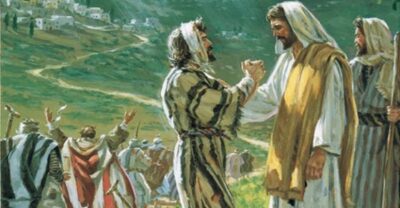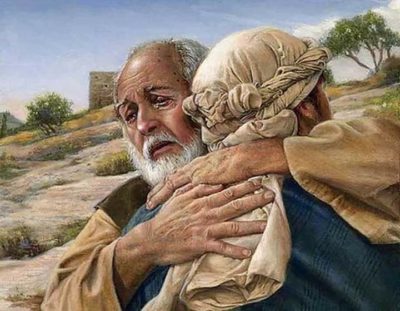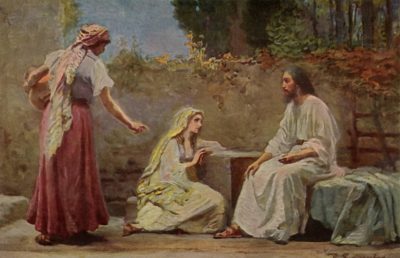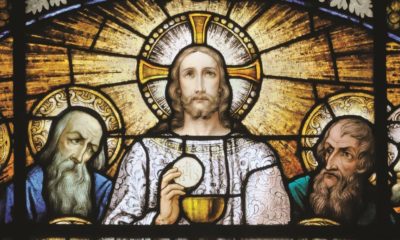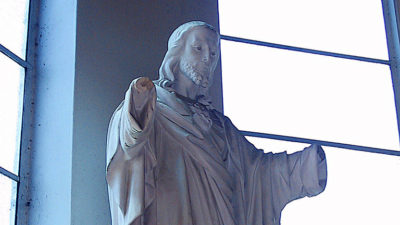May 29, 2022
|by N W
|
0 Comments
|
Discipleship, Evangelization, Father Nixon, Mission
|
Ascension, The Great Commission
The Ascension of the Lord
May 29, 2022 — Year C
Readings: Acts 1:1-11 / Ps 47 / Eph 1:17-23 / Lk 24:46-53
by Rev. Nixon Negparanon, Pastor
The four gospels contain many parables of a master who sets out on a long journey and gives his servants charge of his estate until his return. In the Feast of the Ascension of Our Lord Jesus Christ, this parable becomes a reality. As we have heard in the gospel, Jesus departs to His Heavenly Father and leaves His disciples in charge of the affairs of His kingdom until His return in glory.
Each of the gospels ends with a scene in which Jesus finally takes leave of His disciples. These parallel scenes focus, not on describing the event in detail, but on the last words that Jesus leaves with His disciples. In fact, the very fact of a bodily ascension of Jesus into heaven is described only by Saint Luke.
It is Luke who wrote the Acts of the Apostles, from which we got our first reading today. A later ending of Mark also includes the Ascension. There are important similarities and differences between Luke and Acts, on the one hand, and Matthew and Mark, on the other, regarding the details of His farewell scene.
For example, in Luke/Acts, the ascension takes place in Jerusalem, whereas in Matthew and Mark, it takes place in Galilee. Both traditions, however, agree that it took place on a mountain.
In Luke/Acts, the ascension happens forty days after the Resurrection, during which period Jesus appears repeatedly to His followers. In Matthew and Mark, there is no indication of a time period between the Resurrection and the Ascension. Rather, the first appearance of Jesus to His disciples after His Resurrection is also the last.
So the gospel writers apparently were not aiming at accuracy in historical details. They were more concerned with transmitting a message. So now, the question is: What is the message? What is the charge that Jesus gives His disciples as he physically takes leave of them?
The message, if we look at the different gospels, is phrased differently in the Acts and also in the gospels. Let’s first look at the Acts of the Apostles (Acts 1:8). It says: “But you will receive power, when the Holy Spirit has come upon you, and you will be my witnesses in Jerusalem, in all Judea and Samaria, and to the ends of the earth.”
In Matthew (Mt 28:19-20), it says: “Go, therefore, and make disciples of all nations, baptizing them in the name of the Father, and of the Son, and of the Holy Spirit, and teach them to obey everything that I have commanded you. And remember, I am with you always, to the end of the age.”
The gospel of Mark (Mk 16:15-18) says, “Go into all the world and proclaim the good news to the whole creation. The one who believes and is baptized will be saved, but the one who does not believe will be condemned. And these signs will accompany those who believe: by using my name, they will cast out demons; they will speak in new tongues; they will pick up snakes in their hands; and if they drink any deadly thing, it will not hurt them. They will lay their hands on the sick, and they will recover.”
So, brothers and sisters, these are the last words of Jesus, as recorded differently in the Acts of the Apostles, and in Matthew and Mark. But all of them are in agreement that Jesus gave His disciples a mission, a task to engage in until His return in glory. Second, He assured them of divine assistance in carrying out this mission.
The mission is to be a witness to the good news of Jesus to the ends of the earth, to go into all nations of the world, and proclaim the good news to the whole creation. The universal reach of this mission is very clear. The message of Jesus is meant to be good news in the ears of all humankind, irrespective of nationality or culture.
Given the fact that, today, many nations have embraced other religions in preference to the Gospel, maybe it’s time to ask ourselves: Are these people rejecting the message of Jesus, or are they rejecting the messengers and the way they represented it? The air of superiority and triumphalism assumed by many Christian missionaries is a disservice to the Gospel and not part of the good news. Have we perhaps despoiled a good story in the telling?
At the beginning of the twentieth century, some mission-minded Christians started a periodical and called it “The Christian Century.” That title was an expression of their triumphalist belief that, by the end of the century, the whole world would have been Christianized. Today, we have hopefully grown wiser and humbler, as we realize that, in the twentieth century, not only did we fail to Christianize the whole world, but rather that we added two world wars to our record of “accomplishments.” To this day, there is still war and ongoing threats of war in other parts of the world.
Spreading the good news to all nations is not a goal that can be attained by dint of human mind and craft. That is why Jesus promises to empower His messengers from on high by His abiding presence, and of course, with the help of the Holy Spirit. The challenge of sharing the good news with all humankind should, therefore, begin on our knees, as we confess that we have often taken matters into our own selfish human hands, and promise to give the Holy Spirit a chance.
There is a story told about a small town in Germany that was severely blasted during the last war. Some years later the buildings were restored. One of the buildings was the town’s cathedral. When the renovation was completed, it was noticed that the large figure of Christ the King, which stood in front of the cathedral, was still unrepaired, when both hands had been blown off in the explosion.
When there was no sign of its being repaired, some parishioners went to their pastor to inquire if he had any plans to repair the statue. He surprised them all by saying that, no, he was going to leave the statue exactly as it was. He explained that, when Jesus ascended into heaven, He took His body with Him. He asked us to provide the body, which is the Church, and His Spirit would provide everything else. He would not replace the hands on the statue, to remind people that Jesus has no other hands but ours when it comes to continuing the building of His kingdom here on earth.
Let me end by quoting what Saint Teresa of Avila once said: “Christ has no body now but yours; no hands, no feet on earth but yours. Yours are the eyes through which He looks with compassion on this world. You are the feet with which He walks to do good. Yours are the hands through which He blesses all the world. Yours are the hands; yours are the feet; yours are the eyes. You are His body. Christ has no body now on earth but yours.”
KEEP READING
 540-586-8988
540-586-8988 

